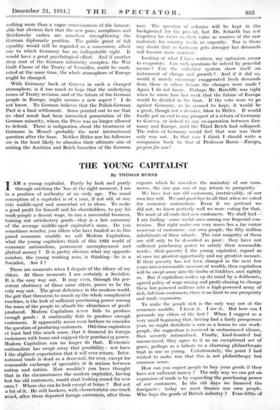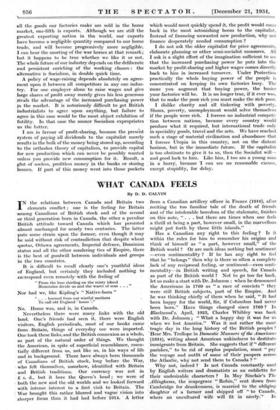THE YOUNG CAPITALIST
By THOMAS BURNS IAM a young capitalist. Partly by luck and partly 1 through catching the 'bus at the right moment, I am in a position of authority at anearly age. The usual conception of a capitalist is of a man, if not old, at any rate middle-aged and somewhat set in ideas. To make a good profit for himself and his shareholders, to pay his work-people a decent wage, to run a successful business, turning out satisfactory goods—that is a fair summary of the average middle-aged capitalist's aims. Do you sometimes wonder, you elders who have landed us in this grand economic muddle we call Modern Capitalism, what the young capitalists think of this 1984 world of economic nationalism, permanent unemployment and glutted money ? It is pretty obvious what my opposite number, the young working man, is thinking—he is a Socialist. Am I ?
There are moments when I despair of the idiocy of my elders. At those moments I am certainly a Socialist. It is. the easy way out. It may even, through the per- sistent obstinacy of those same elders, prove to be the only way. out. The great deficiency in the modern world, the grit that threatens to smash up the whole complicated machine, is the lack of sufficient purchasing power among the mass of the people to absorb the abundance of goods produced. Modern Capitalism never fails to produce enough goods : it continually fails to produce enough customers. It apparently never even bothers to consider the,question of producing customers. Old-time capitalism at least had this much sense, that it financed its foreign customers with loans and enjoyed their purchasing power. Modern Capitalism can no longer do that. Economic nationalism has swept away that possibility : nor have I the slightest expectation that it will ever return. Inter- national trade is dead as a door-nail, for ever, except for reasonable exchange of specialites de la maison between nation and nation. Now wouldn't you have thought that in the circumstances the modern capitalist, having lost his old customers, would start looking round for new ones ? Where else can he look except at home ? But not a bit of it. He still hankers, with characteristic one-track mind, after those departed foreign customers, after those exports which he considers the mainstay of our com- merce, the sine qua non of any return to prosperity.
We have lost our old customers, irretrievably, of our own free will. We said good-bye to all that when we voted for economic nationalism. Even if we pretend we did not, we knew perfectly well we were voting for that. We must at all costs find new customers. We shall find— I am finding—some useful ones among our Imperial con- nexion. But right under our very noses lies a far vaster reservoir of customers—our own people, the fifty million inhabitants of these islands. The vast majority of them are still only to be described as poor : they have not sufficient purchasing power to satisfy their reasonable needs : their poverty I, the young capitalist, regard as at once my greatest opportunity and my greatest menace. If their poverty has not been changed in the next few years into a reasonable measure of wealth, then capitalism will be swept away into the limbo of futilities, and rightly so. But if capitalism makes up its mind by a deliberate, agreed policy of wage-raising and profit-sharing to change these low-powered millions into a high-powered army of rich, full-tinie customers, there is no limit to our prosperity and trade expansion.
To make the people rich is the only way out of the economic muddle. I know it. I see it. But how can I persuade my elders of the fact ? When I suggest as a very small beginning that, having had a fairly prosperous year, we might distribute a sum as a bonus to our Work- people, the suggestion is received in embarrassed silence, then severely rationalized. Finally, kind-hearted but unconvinced, they agree to it as an exceptional act of grace, perhaps as a tribute to a charming philanthropic trait in one so young. Unfortunately, the point I had wished to make was that this is not philanthropy but common sense.
How can you expect people to buy your goods if they have not sufficient money ? The only way we can get an expansion of trade, is by expanding the purchasing power of our customers. In the old days we financed the foreigners : today we must finance our own people. Who buys the, goods of British industry ? Four-fifths of all the goods our factories make are sold in the home market, one-fifth is exports. Although we are still the greatest exporting nation in the world, our exports have become a negligible quantity compared to our home trade, and will become progressively more negligible. I can hear the snorting of the war horses at that remark; but it happens to be true whether we like it or not. The whole future of our industry depends on the deliberate and persistent enriching of the working classes : the alternative is Socialism, in double quick time.
A policy of wage-raising depends absolutely on agree- Ment upon it between all competitors in any one indus- try. For one employer alone to raise wages and give .large shares of profit away merely gives his less generous rivals the advantage of the increased purchasing power in the market. It is notoriously difficult to get British industrialists to agree upon anything, but failure to agree in this case would be the most abject exhibition of futility. In that case the sooner Socialism expropriates us the better.
I am in favour of profit-sharing, because the present system of paying all dividends to the capitalist merely results in the bulk of the money being stored up, according to the orthodox theory of capitalism, to provide capital for new production which can never be possibly wanted unless you provide new consumption for it. Result, a glut of useless, profitless money in the banks or storing houses. If part of this money went into those pockets which would most quickly spend it, the profit would come back in the most astonishing boom to the capitalist. Instead of financing unwanted new production, why not finance desperately needed consumption ? I do not ask the older capitalist for price agreements, elaborate planning or other semi-socialist measures. All I ask is a slight effort of the imagination sufficient to see that the increased purchasing power he puts into the market by profit-sharing and higher wages-comes directly back to him in increased turnover. Under Protection practically the whole buying power • of the people is concentrated on keeping its own factories busy. The more you augment that -buying power, the busier your factories will be. It is no longer true, if it ever was, 'that to make the poor rich you must make the -rich poor.
I dislike charity and all tinkering with poverty. Slums, poverty, unemployment would solve themselves if the people were rich. I foresee no industrial -competi- tion between nations, because every country would produce what it required, but international trade only in speciality goods, travel and the arts. We have reached such a stage of material civilization and abundance that I foresee Utopia in this country, not on the distant horizon, -but in- the immediate future. If the capitalist is too obstinate to give it to us, then the Socialist will— and good luck to him. Like him, I too am a young man in a hurry, because 'I can see no reasonable excuse, except stupidity, for delay.



































 Previous page
Previous page